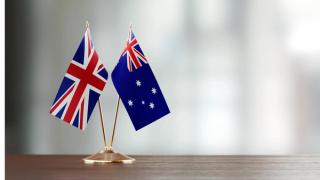Recent months have seen intense high-level diplomacy by Australia’s cabinet ministers. Off the back of a successful AUSMIN meeting in Washington, 2+2 ministerial talks in Japan and, following a ministerial meeting with their French counterparts in Paris next week, Deputy Prime Minister and Defence Minister Richard Marles and Foreign Minister Penny Wong will be travelling to London for the Australia-UK Ministerial Consultations (AUKMIN). This flurry of engagement with key strategic partners has introduced the Albanese government to its allies and partners and underscored its determination to coordinate and cooperate in the Indo-Pacific.
The upcoming AUKMIN is particularly important to Australian statecraft and the future work of the Australia-US alliance, in light of both the Australia-United Kingdom-US (AUKUS) partnership and the United Kingdom’s Indo-Pacific “tilt”. This USSC explainer discusses what prospective outcomes from AUKMIN 2023 could mean for Australia’s global interests, in relation to AUKUS, China, Ukraine, technology and trade.
What is AUKMIN?
AUKMIN is the most significant bilateral meeting on matters of foreign policy and defence between senior Australian and British officials. It has been held since 2006 when Prime Ministers Howard and Blair first convened the dialogue. There have been 11 AUKMINs during that time, with the annual event most recently interrupted by a four-year lapse due to Brexit-related postponement and the COVID-19 pandemic.
Next week, Deputy Prime Minister Marles and Foreign Minister Wong will meet with British Secretary of State for Defence Ben Wallace and Secretary of State for Foreign Affairs James Cleverly. It will be the first AUKMIN meeting of the Albanese and Sunak governments. They will be joined by the newly appointed Australian High Commissioner Stephen Smith in one of his first duties. The appointment of Smith – the co-lead of the Australian Government’s near-complete Defence Strategic Review as well as a former Defence Minister and Foreign Minister – is evidence of the perceived importance of the United Kingdom to implementing Australia’s strategic policy.
Throughout the 2010s, AUKMIN heralded few public announcements of relevance to key Australian strategic interests. The only significant announcement of AUKMIN 2022 was the deployment of two small Royal Navy vessels, though the Joint Statement certainly signalled a renewed energy in the partnership. Notwithstanding past consultations often heavy focus on extra-regional concerns, including counterextremism in the Middle East, a growing strategic alignment regarding China has spurred a growing defence agenda from 2018 onwards.
What can we expect from AUKMIN 2023?
Developments in the past year are a testament to the increasing relevance of the Australia-UK partnership; the Australia-UK Free Trade Agreement (A-UKFTA) entered into law in Australia, a bilateral submariner training program was announced and the first AUKUS Defence Ministerial was held. At the same time, much remains unclear about the United Kingdom’s contribution to AUKUS and its previously-announced commitment to deepen engagement in the Indo-Pacific following the recent House of Lords Committee report cautioning over-commitment to the region while the European security environment deteriorates. Additionally, AUKMIN will be held against the backdrop of an economic crisis in the United Kingdom. Much is also uncertain about new Prime Minister Rishi Sunak’s approach to partners, including in relation to China and the Indo-Pacific, following the second change in UK leadership in six months.
Discussion of the two countries’ ongoing support for Ukraine is certain to feature in the AUKMIN joint statement. As the second largest military donor to Ukraine, committing approximately A$4 billion in 2022, the United Kingdom has a vested interest in the continuation of related Australian support. The recent announcement that Australian troops would join an international mission in the United Kingdom to provide training to the Ukrainian Armed Forces as part of Operation Kudu was celebrated on the floor of the British Parliament. Any cooperation confirmed or extended at AUKMIN is also of significance to the US-Australia alliance, both in fuelling the message of a global coalition of democracies promoted by the Biden administration, and in its deterrent effects for other regions of concern.
At AUKMIN, both partners may clarify their alignment on strategic competition with China. British Prime Minister Rishi Sunak’s early promise to “evolve” the United Kingdom’s approach to China – emphasising strategic competition as well as limited cooperation – appears to be in harmony with the Albanese government’s approach. This year’s ministerial consultations may also develop upon the 16-point plan to defend the rules-based order laid out at AUKMIN 2018 and possibly announce an increased UK presence at this year’s Exercise Talisman Sabre. However, unresolved debates in the United Kingdom about the wisdom of both the tilt and competition with China will constrain associated discussions.
With the 18-month Nuclear-Powered Submarine Review ongoing until March 2023 and, as Washington is not a participant in AUKMIN, significant AUKUS announcements are unlikely. However, the UK Defence Secretary and Australian Defence Minister’s 2022 comments about a trilateral approach to submarine design suggest that attention may be given to AUKUS pillar one behind closed doors. In terms of public announcements, the Joint Statement may preview bilateral cooperation on two AUKUS-related lines of effort: labour mobility, and research and innovation.
Following the recent progression of the Australia-United Kingdom Free Trade Agreement (A-UKFTA) and the September 2022 joint submariner training announcement, AUKMIN may be an opportunity to collaborate on AUKUS-related skilled labour mobility. The Australian Government is particularly attuned to the obstacles workforce constraints represent for implementing AUKUS. Whilst not yet passed through the British Parliament, A-UKFTA will enable expediated visa arrangements. AUKMIN may also provide an opportunity announce the removal of further barriers that would help pool talent and plug key capability and skills gaps, as suggested by Jennifer Jackett in her 2022 USSC report.
Another area of bilateral collaboration that could feature at AUKMIN 2023 is the building of science and technology partnerships across the university and corporate R&D ecosystem to bolster the second pillar of AUKUS – advanced capabilities. A well calibrated Joint Statement may announce partnerships in relevant areas such as quantum computing and artificial intelligence, although Australia will be attuned to the US and UK’s somewhat competitive industrial industries.
Further, AUKMIN provides an opportunity for the principals to build on existing progress in other areas of technology and innovation unrelated to AUKUS. One likely area of focus is the UK-Australia Cyber and Critical Technology Partnership, introduced in 2022 to cement a practical and values-driven approach to managing opportunities and challenges in these areas. Beyond the first-order priorities of this partnership, including maintaining an open, free, peaceful and secure internet, novel cooperation is a possibility in areas such as maritime digital infrastructure resilience, particularly in Southeast Asia, which has a significant concentration of undersea cables and other essential enablers of global data flows that facilitate internet operation.
Implications for the Australia-US alliance
The United States will observe AUKMIN with interest. The Biden administration has strengthened its bilateral engagement with these two critical US allies, including at last year’s AUSMIN and at a meeting last week between Secretary Cleverly and Secretary of State Antony Blinken. At the same time, as we have previously argued, the Biden administration is eager for its European and Indo-Pacific allies to coordinate independently, and often refers to their regions as interlinked.
As debates continue about whether conflict in Europe will mean the end of the British tilt, AUKMIN will not be enough to dispel doubts about the extent of the United Kingdom’s strategic convergence with Australia and the United States in the Indo-Pacific. This will require greater and sustained action, as argued by Ian Hall.
Announcements which emerge at AUKMIN relating to enhanced cooperation in the maritime domain – particularly an increased UK presence at Exercise Talisman Sabre – could assist in safeguarding the shared interests of the US alliance system in the Indo-Pacific. Furthermore, efforts to develop substantive cooperation between Australia and the UK at AUKMIN would represent a meaningful step to ensuring the AUKUS partnership is able to deliver in future. Though there are undeniable limits to what any country can commit outside of its own theatre, at this year’s AUKMIN, Australia will be hoping to hear the United Kingdom is serious about furthering its commitments to the Indo-Pacific.







